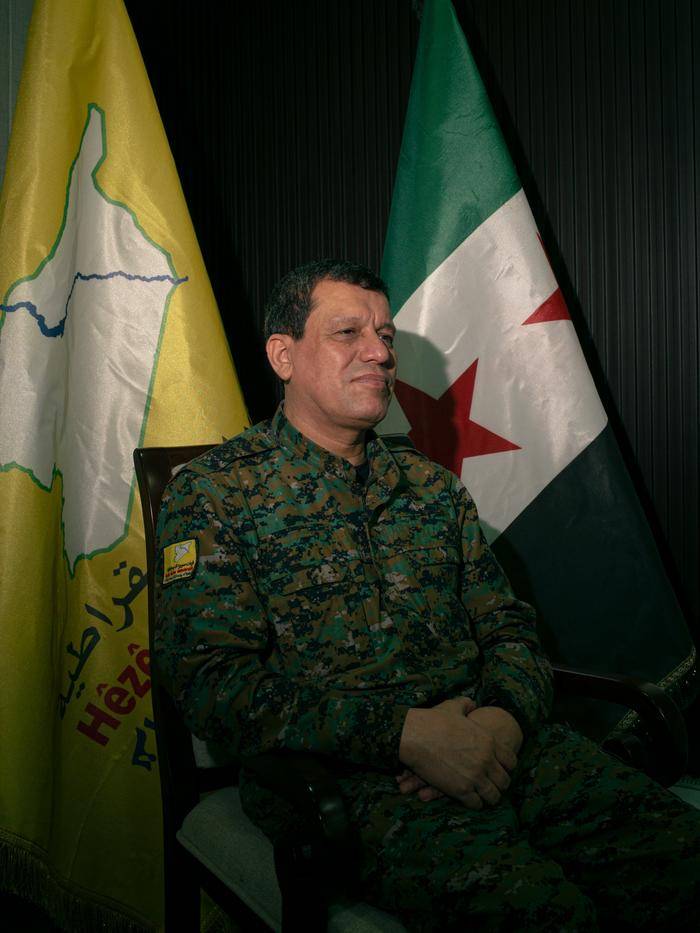Syrian Kurdish Commander Mazloum Abdi Seeks Reinforced Autonomy Amidst Regional Tensions
Mazloum Abdi, the commander-in-chief of the Syrian Democratic Forces (SDF), has reiterated his call for reinforced autonomy in northeastern Syria, emphasizing that the Kurdish-led forces are not seeking secession from the country ¹. This development comes amidst ongoing tensions between the SDF and the Turkish government, which has long viewed the Kurdish forces as a threat to its national security.
Abdi's statement is seen as a crucial step towards finding a peaceful resolution to the conflict in northeastern Syria. The region has been a hotbed of tensions since the start of the Syrian civil war, with various factions vying for control. The SDF, which is dominated by Kurdish forces, has established a semi-autonomous administration in the region, which has been a major point of contention with the Turkish government.
Turkey views the SDF as an extension of the Kurdistan Workers' Party (PKK), a militant group that has been waging a decades-long insurgency against the Turkish state. Ankara has repeatedly called on the SDF to disavow its ties with the PKK, a demand that the Kurdish forces have so far refused to meet ².
Despite these tensions, Abdi remains optimistic about the prospects for a peaceful resolution to the conflict. In a recent interview, he emphasized that the SDF is committed to finding a solution that respects the rights and interests of all parties involved ³.
"We do not accept a return to the past," Abdi said. "The Autonomous Administration has existed for ten years, and they must accept it constitutionally."
The Autonomous Administration, also known as the Rojava region, has been a major point of contention in the conflict. The region is home to a significant Kurdish population, and the SDF has established a semi-autonomous administration there. However, the Turkish government views the region as a threat to its national security, and has repeatedly called on the SDF to disband the administration.
Abdi's call for reinforced autonomy is seen as a compromise solution that could potentially address the concerns of all parties involved. However, it remains to be seen whether the Turkish government will accept this proposal, or whether it will continue to push for the disbandment of the SDF and the Autonomous Administration.
As the situation in northeastern Syria continues to unfold, one thing is clear: the region remains a major flashpoint in the conflict, and finding a peaceful resolution will require careful diplomacy and compromise from all parties involved.
- *Mazloum Abdi*: Commander-in-chief of the Syrian Democratic Forces (SDF)
- *Recep Tayyip Erdogan*: President of Turkey
- *Kurdistan Workers' Party (PKK)*: Militant group that has been waging a decades-long insurgency against the Turkish state
- *Syrian Democratic Forces (SDF)*: Kurdish-led forces that have established a semi-autonomous administration in northeastern Syria
- *Turkish military operation*: Turkey launched a military operation in northeastern Syria in October 2019, aimed at pushing the SDF back from the border
- *US withdrawal*: The US withdrew its troops from northeastern Syria in October 2019, leaving the SDF vulnerable to Turkish attack
- *Russian involvement*: Russia has become increasingly involved in the conflict, providing military support to the Syrian government and negotiating with the SDF
As the situation in northeastern Syria continues to unfold, it remains to be seen whether Abdi's call for reinforced autonomy will be accepted by the Turkish government. One thing is clear, however: finding a peaceful resolution to the conflict will require careful diplomacy and compromise from all parties involved.


